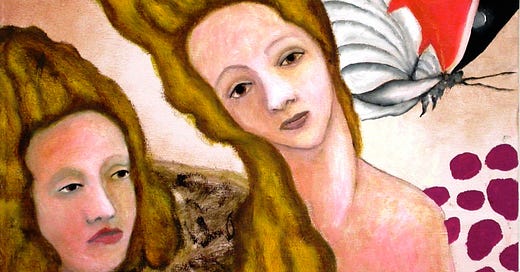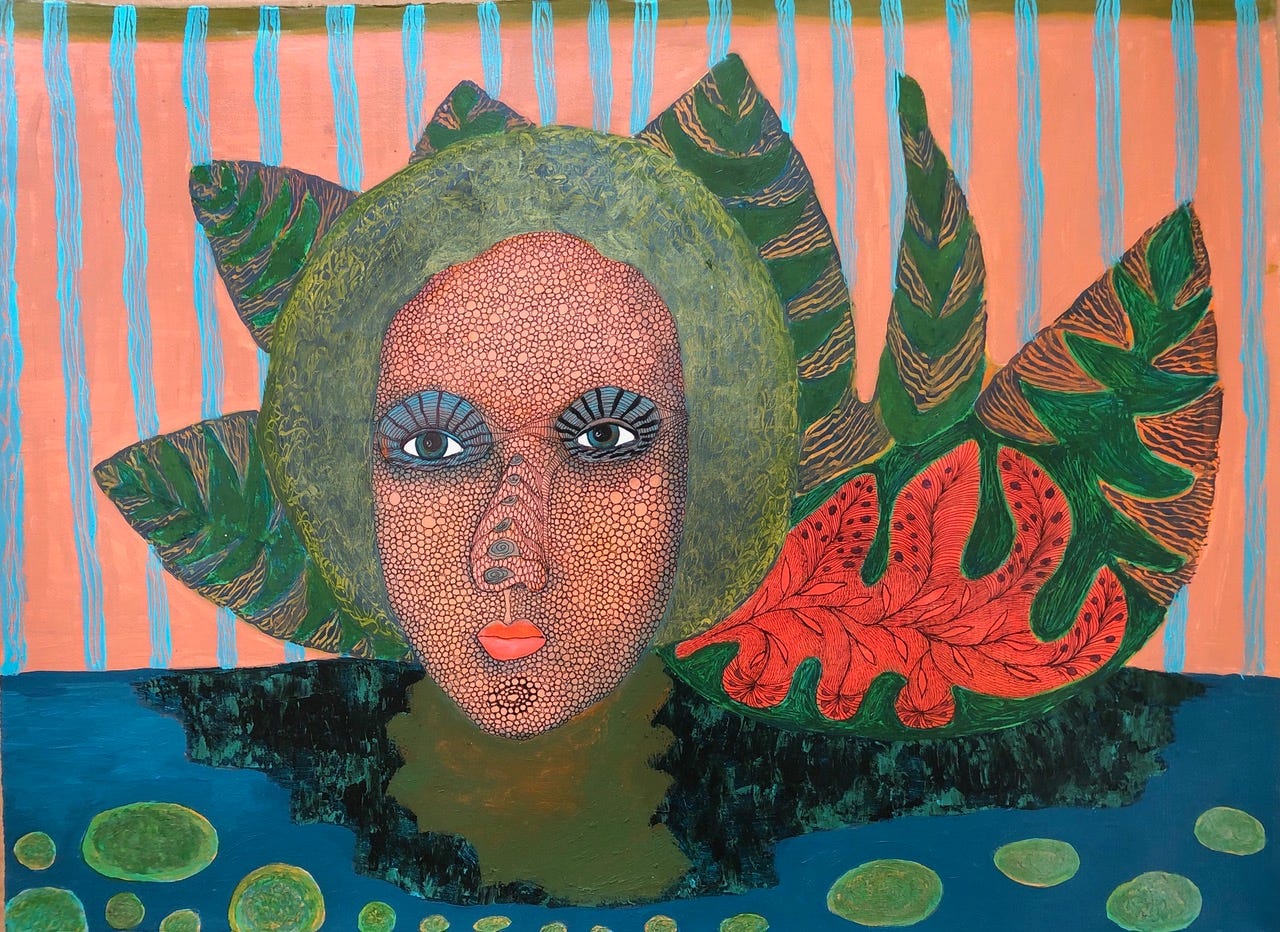Welcome to the April Issue
It seems to me that every month should be National Poetry Month. Isn’t it a red flag that you’re overlooked, underappreciated, and marginalized if someone assigns you a special month? I’m thinking here of Black History Month and Women’s History Month.
But, I digress…
An ekphrastic poem is a poetic reflection on a work of art. The poet takes inspiration from the work of art, “narrates” the action dipicted, and amplifies and expands its meaning. Both poem and painting benefit from this enhancement.
This month we see this collaboration in action between poet Eileen P. Kennedy and artist Irene Christensen. Enjoy the artwork and three ekphrastic poems that follow. Keep reading to learn more about the artist and writer.
Write on!
Linda
Daydreams
Daydreams
Two enigmatic women, their Botticelli beauty looms undeniable. Like the butterfly they long to glide away, their earth in tatters. Floating between blood and a wrathful world naked, they envision peace.
Māori Woman
Māori Woman
She weaves her fate carefully. Bone and ancient music guide her face marks to solemnize her ancestors and move forward with tomorrow. The karaka tree soothes the symbols with its balm mending as the woman heals. She creates wananga to enhance her knowledge. Mystical memory grows awareness.
I Feel Close to Nature Too
I Feel Close to Nature Too
I feel close to nature too earth moves in the hot sky green leaves grow my hair mountains erupt my skin when you step on me I cry I feel close to nature too my eyes wash blue seashells my face erodes sand from the shore ground has no home for living suffocating in a polluted candy corn sky I feel close to nature too writhing, dying in the heat a red leaf dragon swallows the trees growing in the night forest I must preserve the charging planet beast I feel close to nature too
About the Artist
Irene Christensen’s art is about painting as a magical act. Her images repeat and are transformed, as words and images in poems. She likes to maintain a sense of wonder in her art. That life is strange and quirky, and contradictory, that tragedy and comedy are not played out in separate theaters, but co-exist, side by side. Learn more here.
About the Poet
Eileen P. Kennedy is the author of two collections of poetry: Banshees (Flutter Press, 2015), which was nominated for a Pushcart Prize and won Second Prize in Poetry from the Wordwrite Book Awards, and Touch My Head Softly (Finishing Line Press, 2021) which Literary Titan has described as “emotionally-charged poetry that explores life with observant poems that will appeal to anyone who loves inspired poetry.” It was a finalist for the International Book Awards in General Poetry. She lives in Amherst, MA with the ghost of Emily Dickinson. More at www.EileenPKennedy.com.
An Interview with Eileen P. Kennedy
LC: When did you start writing and what inspired you?
EPK: My first memory of writing creatively is from when I was about 8 years old. I had drawn and learned to write letters by then, but it was an epiphany to realize that I could put pencil to paper and “make something” from the words.
LC: Can you describe how you grew into the identity of a writer/poet?
EPK: I think I had good teachers who encouraged me once they realized I was a creative writer. I remember having the task assigned to me of writing a skit for a class play and receiving a lot of attention for it. I have no conscious memory of anytime I didn’t identify as a writer.
LC: Who are some of your favorite poets/writers?
EPK: Well, I live in the same town where Emily Dickinson lived and have always enjoyed her writing. I also like Dana Gioia, Sharon Olds and Carolyn Forché. I have spent most of the last 20 winters in Central America and love Spanish poets like José Martí, Clara Allende, Pablo Neruda, Julieta Dobles and Federico García Lorca. I’m functional in Spanish and like to read them in Spanish and English. Spanish read aloud is so beautiful.
LC: How has your writing/poetry changed over the years?
EPK: My writing is always changing. I was an academic for many years, so I published an academic book and many research articles, but I always wrote creatively. I published two collections of poetry, one on aging and one on the death of a partner with Alzheimer’s, but my writing has recently concentrated on writing ekphrastic poetry in response to the work of a Norwegian artist, Irene Christensen, who I met in Costa Rica.
LC: What are your sources of inspiration?
EPK: Among many other things, writing and art. I’ve discussed the poets I like to read, but many artists have inspired me too. Terry Rooney does art about houses and politics right here in Amherst. Irene Christensen, whose art is displayed here with my three poems, inspired more than 20 of my poems. Her work is so complex, layered and interesting, it encourages me to respond. I’ve read or exhibited poems with both artists. Irene and I are hoping to make a book of poems and paintings together.
LC: Do you know a funny story about writing?
EPK: A kayak, a canoe and a paddleboard walk into a bar and start to write…
LC: What advice would you give to aspiring writers/poets?
EPK: You don’t choose to be a writer. It chooses you. If you can’t stop writing despite the fact that you’re being rejected and not making money, then you’re a writer. No amount of good or bad advice will change it.
LC: How often do you write?
EPK: Pretty much every day, except with some breaks on weekends or vacation. I belong to a few writing groups and the community helps with the isolation.
LC: What is your process for writing a poem?
EPK: The nearest I come to a process is starting a poem in my journal, which I keep in Word on my iPhone. I used to journal on paper, but I find I don’t always have my notebook, but I do always have my iPhone. If I get an idea and can’t write a whole poem, I make a journal entry and return to it later. Aside from that, poems come in all different ways. I have been known to stand barefoot in a stream with pencil and paper until an idea came.
LC: How has being a writer influenced the way to see the world?
EPK: I think writing about the world is a way of seeing and processing it. I was a union activist for many years and a journalist. Irene’s art series is about women and the struggling environment, something I care deeply about. These experiences have impacted my writing, especially in my political poems.
LC: How do you know when a poem is finished?
EPK: I don’t. I’m usually revising till the final deadline. If anyone knows, let me know.










Beautiful paintings, beautiful poetry, and a lovely edition of this newsletter.
Thanks so much for the interview. Its
so nice to hear from locals, esp artists of any kind (with
kudos to writers and painters).
- -Chad